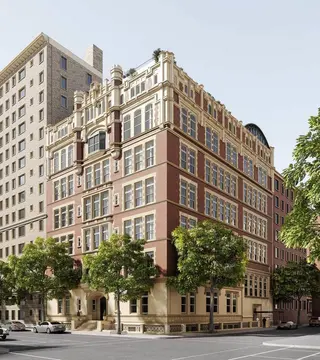 Carter Horsley
Carter HorsleyNov 27, 2018
Carter's Review
This very handsome, mid-rise building on the southwest corner of 87th Street at 555 West End Avenue is one of the most distinctive on the avenue.
The 8-story building was erected in 1908 as the St. Agnes School for Girls by the New York Presbyterian Church. It later became the St. Agnes School for Boys.
William A. Boring was the architect.
It has 13 condominium apartments. Charles Ferrer was the interior designer for the project.
The building was acquired in by Cary Tamarkin, the head of the Tamarkin Group whose other projects in the city include 436 West 24th Street, 10 Sullivan Street and 47 East 91st Street, and CL Investment Group for $50 million in 2014.
The developers added a floor to the 7-story building which is within an historic landmark district.
A December 4, 2014 article at the westsider noted that the developers paid $50 million for the St. Agnes Boys High School to the Roman Catholic Archdiocese of New York. The school had been shut down after the 2012-3 school year.
According to the article, “The school was built by the New York Protestant Episcopal School Corporation (aka Trinity School) to house St. Agatha’s School for Girls (established 1898) its sister school. Trinity sold the building to the Roman Catholic Archdiocese in 1941 and it became the home of Cathedral College, a high school and college seminary. Since 1992, it has housed St. Agnes Boys’ High School, a Roman Catholic school formerly located on East 44th Street.”
It is directly across the avenue from the St. Ignatius Protestant Episcopal Church that was designed in the Neo-Gothic style by Charles Haight.
The south end of that block is occupied by the rectory of the Church of St. Paul & St. Andrew and the church that was designed in 1895 by R. H. Robertson.
In his April 19, 1987 "Streetscapes" article in The New York Times, Christopher Gray provided the following commentary about the building:
"Mr. Robertson had been the city's pre-eminent designer of Romanesque churches, but by 1895 the Renaissance tradition was sweeping the country. For the St. Paul congregation, Mr. Robertson produced a vast, tile-roofed shed in light colors of brick and terra cotta, with two enormous towers on the West End Avenue front.
"The church...is in the basilica form of an early Christian church, with a simple, oblong shape and a row of windows just below the eave. But the monumental Corinthian pilasters on West End Avenue and the arched entrance on the West 86th Street side are distinctly Renaissance in character, while the six oversized angel figures above the West End Avenue entrance seem drawn directly from contemporary American art of the period.
"The most-striking feature of the church is its unequal pair of high, open towers on the West End Avenue front. Without bells, they have no apparent function and are haunting, evocative forms....
"Architectural critics of the period gave the church mixed notices. The Architectural Review called the main entrance 'full of poetic feeling,' but described the towers as 'ungainly and ill-balanced.' Today, the church ranks among the most-memorable....
"Although most of the Christian churches there were built before 1910, most synagogues went up after 1920, and in the 1930s the West Side became home to thousands of Jewish immigrants fleeing Nazi persecution. St. Paul suffered a loss in attendance, and in 1937 it took in and merged with the congregation of the Methodist Church of St. Andrew, which had on West 76th Street between Columbus and Amsterdam Avenues.
This building is one block to the east from Riverside Park and one block to the west of Broadway and public buses and subways.
Bottom Line
An imposing and colorful major landmark on West End Avenue, it was formerly a school and was converted into large condominium apartments by Cary Tamarkin and CL Investment Group in 2018.
Description
This Collegiate Gothic building has a limestone base, red brick upper stories, and limestone trim.
It has a Tudor-arch entrance, drip lintels resting on angel corbels, crenellated parapet, and turrets supported by owl corbels.
The lobby has a three-step-up section and is wood-paneled.
Its avenue frontage is highlighted by its middle five stories of tall windows grouped in threes and separated by quite small windows between the outer two bays. The middle bay on the sixth floor has arched windows that are between two-story high crenellated turrets that originally extended above the roofline and are slightly higher than the non-crenellated towers at the building's corners.
Amenities
The building has a full-time doorman, a gym, a recreation room, a bicycle room, a laundry, and storage.
Apartments
Apartments have ceilings of 12 or more feet, washers and dryers and each one has its own storage unit. Kitchens have solid white oak cabinetry by Christopher Peacock, Pietra Cardosa stone floors, polished Arabescato marble slab countertops and appliances by Miele, Wolf and Sub-Zero.
Apartments 5E is a five-bedroom unit with 3,474 square feet has a 21-foot-long entry foyer that leads to a 29-foot-long great room next to a 19-foot-long, eat-in kitchen with sliding doors and an island.
The Library Apartment on the second floor and mezzanine has 3,462 square feet, five bedrooms and a 42-foot-long great room with a ceiling over 18 feet high.
The Solarium Penthouse is the former gymnasium of the school that occupied the building and it is a three-bedroom unit with 3,420 square feet of interior space and 491 square feet of external space, a 13-foot-long entry foyer that leads to a 37-foot-long, skylit great room with an open corner kitchen, a 19-foot-high arched ceiling and a 37-foot-long terrace.
Apartment 3W is a four-bedroom unit with 2,716 square feet and a 12-foot-long entry foyer that leads to a 28-foot-long great room next to a 21-foot-long eat-in kitchen with an island and sliding doors.

- Condo built in 1908
- Converted in 2019
- 3 apartments currently for sale ($9.9M to $18M)
- Located in Riverside Dr./West End Ave.
- 13 total apartments 13 total apartments
- 8 recent sales ($7.4M to $12M)
- Doorman

 6sqft delivers the latest on real estate, architecture, and design, straight from New York City.
6sqft delivers the latest on real estate, architecture, and design, straight from New York City.
